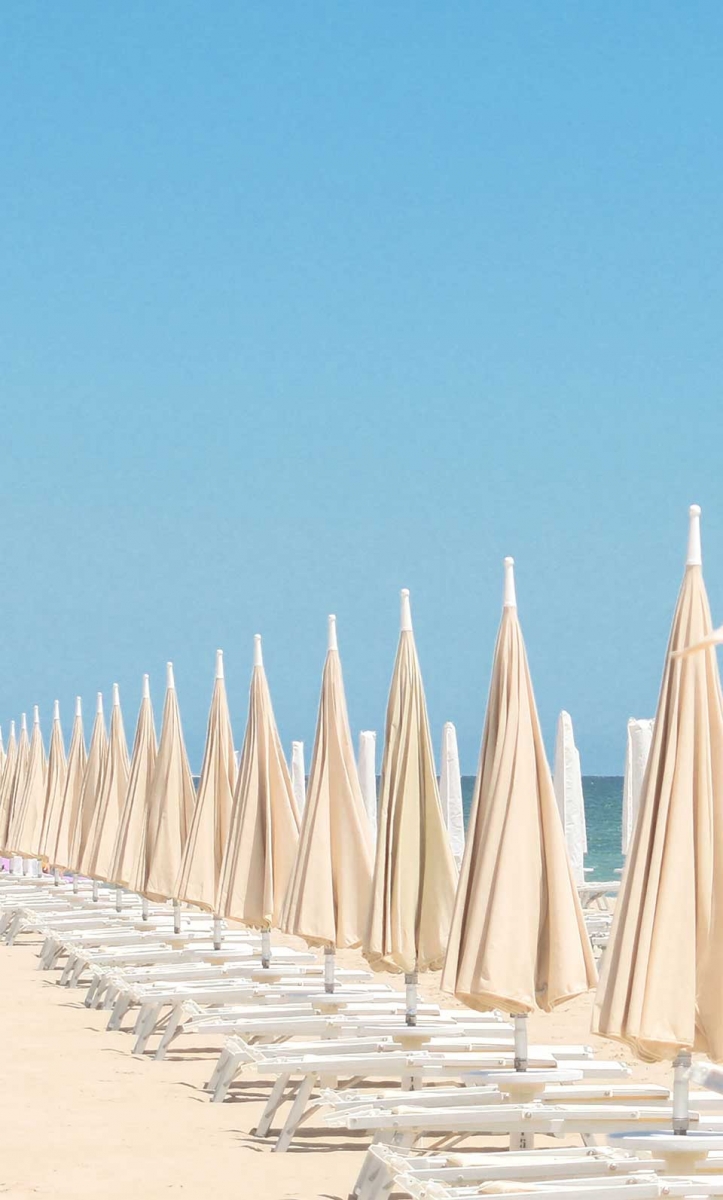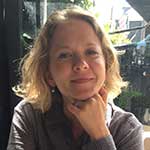Boundaries

Find a spot near some water and let yourself be transported to the Italian seaside in this story of two teens who meet on the beach and form a quick intimacy.
The stretch of public beach between Rimini and Riccione is a no-man’s-land, precisely five hundred meters of empty space with signposts that mark where it begins and where it ends. It’s there, on that strip of sand that doesn’t exist on any map, that Vera always spreads her towel. Late afternoon is her favorite time of day, an hour before sunset, when the tourists have gone back to their hotels for dinner, the wind has drifted off, and the sun casts long shadows. She likes to be alone with a book—any book, as long as it’s not assigned for school—with the soundtrack of screeching seagulls in the background. She chooses a spot near the water, lays out her towel, removes and carefully folds her T-shirt, and sits. She arranges her flip-flops next to her bag and pulls out her book. Then she ties her hair up high so that her neck can tan. Some of it’s too short for the ponytail and falls across her face, but she doesn’t try to tuck it back.
She likes to be alone with a book—any book, as long as it’s not assigned for school.
She starts to read, knowing that she won’t get past a few pages before something distracts her: a person strolling by, a wave reaching her feet, a dog sniffing at her bag. It doesn’t matter because right now she feels good—she’ll smile at passersby, let her feet get wet, pet the dog. The book is just an excuse, after all.
*
“What are you reading?”
The silhouette of a boy with short, bushy hair falls over Vera’s book and she shuts it instinctively, setting it down on the opposite side.
“I wasn’t reading.”
“Okay.”
The shadow doesn’t go away. Vera looks up, but the sun is right behind the boy and she can’t make out who it is.
“Do I know you?”
“No, but hi, nice to meet you, I’m Luca. I’m that umbrella over there.”
She looks over to where he’s pointing, at rows of identical umbrellas on the private beach.
“Vera.”
She shakes his hand when he offers it, though she still can’t really see his face.
“You from here?” he asks.
“Yes. Actually, I was just about to go home.”
“Ah. I get the hint.”
He starts to leave, but then turns back.
“It’s just that I’m on vacation with my grandparents and I’ve been with them all day. . . . I thought I might go for a swim. You don’t want to come, do you?”
“For a swim?”
“Sorry, never mind. Probably not,” he says, noticing her shorts are still on.
Vera looks at the sea’s calm waves, the gentle foam. She knows the temperature of the water is perfect right now.
“Actually . . . maybe. Kinda,” she says but doesn’t move.
“Okay.”
Luca sits next to her and doesn’t mention swimming again.
“I’m in my last year of high school. Math concentration,” he says after a few minutes.
“Arts.”
“I really suck at drawing. I’m only good with numbers.”
“I hate drawing.”
“Then why’re you doing . . .”
“I like photography.”
Vera turns and finally sees him: his gray-green eyes, some acne on his cheeks and forehead. He looks down.
“You look like someone who always gets good grades,” she says.
“Great. It’s that obvious?”
She turns away, hiding the hint of a smile. The sky is so clear that she can see the entire Gabicce Promontory. It’s almost as if she can reach out her hand and touch it.
The sky is so clear that she can see the entire Gabicce Promontory.
“So you don’t study that much?” Luca says.
“Only when I feel like it.”
“As in never.”
“Almost never.”
“Are you failing any of your classes?”
“Math. Chemistry. History.”
“History?”
“The teacher’s a bitch.”
“I’m sure.”
“Are you being sarcastic?”
“No, no, I believe you, I believe you.”
“Whatever. I don’t give a shit if they flunk me.”
“Sounds to me like you might.”
“I guess I don’t really know what I want to do with my life.”
“Didn’t you say you like photography?”
Vera doesn’t answer. “What do you want to do?”
Luca thinks for a minute. “I haven’t made up my mind yet.”
“But you can’t wait to graduate.”
“Of course I can’t.”
“Why?”
“Because I want to get away from home as soon as possible.”
“The thought of getting away from home makes you feel better?”
“Why? Doesn’t it make you feel better?”
“I don’t know, I don’t think so.”
As she stares at the horizon, it fades, becomes almost liquid.
“I always wondered what it’s like to live near the water,” he says after a little.
Vera undoes her ponytail and slowly combs her fingers through her hair. “It’s the same as everything else that’s always there. You get sick of it after a while.”
“I’m pretty sure I’d like it.”
“Some days I don’t even come here, I don’t even feel like it,” she says as if she needs to justify herself. “Plus, the people I meet here always end up going away.”
Luca runs his hand over the sand, scoops up a handful, and lets it fall through his fingers.
“Where do you want to live?”
She looks to the south. “In a place full of color, like India.”
“You’d seriously live there? All year?”
“I think so.”
“Wouldn’t you get sick of all the color after a while?”
“Maybe. I get sick of everything.” She looks up into the boy’s eyes—they seem greener now. “Do you think things’ll be better when we grow up?”
“I hope so.”
Vera looks down again. “How about you? Where do you want to live?”
“I don’t know—maybe Rimini?”
“Oh, come on!”
“No, I’m serious. I like the idea of living in a place where people go for vacation. It would make me feel important.”
“But tourists get annoying after a while.”
He laughs. “Yeah, I can think of one or two,” he says, and manages to get a smile out of her. “How about this: tell me all the things you’re not sick of yet.”
“Why should I tell you?”
He shrugs his shoulders. “Because. It’s a game.”
“Can’t think of any.”
“There’s got to be something.”
Vera pretends to consider it. “Mmm, lasagna?”
“That’s a start.”
“But I guess if I had it every day, I’d get sick of that too.”
“But it hasn’t happened yet.”
“Okay, you have a point.”
“What else?”
“My cat, maybe.”
“You can come up with something better than that.”
This time Vera really thinks about it. “Listening to music with my eyes closed. I do it every night and never get sick of it.”
Luca nods. “There, see?” He gives her a faint smile, but she’s not looking at him.
“Now it’s your turn.”
“For what?”
“Tell me three things you like to do. And don’t say studying.”
“I wasn’t going to.”
Vera glances at him to see if he’s serious but doesn’t say anything.
“Fine. Skiing. Driving. Comics.”
“You’re such a nerd,” she says. “And you’re also extremely boring.”
Suddenly she hops up, pulls off her shorts, and stuffs them into her bag. She runs toward the sea.
*
Vera has to wade in several meters before the water reaches her waist. She hurries because she can feel Luca’s eyes on her. He’s definitely checking out her butt, or even worse, her thighs—she knows they’re too big.
Luca’s actually not looking at her at all. He’s barely made it in up to his ankles. He keeps his eyes glued to his feet because he’s scared of crabs.
She doesn’t wait. While he makes his way to her, she dives in and swims, lets the water rush through her hair, whips it back off her forehead. Every time she goes under, her swimsuit slips down a little and she has to pull it back up.
Finally, Luca joins her. They keep their bodies a safe distance apart.
“You’re a good swimmer.”
“I get by,” she says. “Unlike you.”
Luca shakes his head, laughing. “Yeah, I suck. But I have an excuse. I’m from up north.”
Vera stares at his long, thick lashes, almost like a girl’s. If she could separate his eyes from the rest of his face, he might even be cute.
“Let’s try something, but you have to go in really deep, like where you can’t touch the bottom. Wanna do it?”
He raises his eyebrows, grins, and just stares at her.
“Don’t be such a perv! Trust me.”
“Okay.”
Vera swims out further and he follows, barely keeping up. This time she slows down whenever he falls behind.
The buoy marks the boundary past which swimmers aren’t supposed to go, an imaginary line between the tame and the wild.
They stop at a big orange buoy anchored by a coarse rope. The buoy marks the boundary past which swimmers aren’t supposed to go, an imaginary line between the tame and the wild.
“Okay, hold on here,” Vera says, and then shows him what to do: she grabs onto the buoy with both hands and lets her legs drift out behind her, then the rest of her body so that she’s floating horizontally, her feet kicking in place like she’s running.
Luca watches and follows her lead with some hesitation. He lets one leg drift up, then the other, closes his eyes, and immediately understands what it means to give in to the water’s pull, to almost feel that his body’s no longer his, that he’s no longer in the driver’s seat.
“Sometimes when the current’s stronger, it’s almost like you’re on a ride,” Vera says. “Still, not bad, right?”
He nods.
They float that way for several minutes, their bodies barely touching, anchored to the buoy and abandoned to the sea.
Luca feels like he should say something, but he can’t quite find the words. He focuses on the sound of the waves, the cries of the seagulls, on Vera’s long hair tickling his shoulder. He tries letting his legs sink down to feel the patch of cold water a little deeper—it’s easily ten degrees cooler than right below his stomach.
Vera lets go first and without saying a word swims steadily toward shore. Before Luca catches up, she’s already wrapping herself in her towel.
*
“I wasn’t being totally honest before,” Vera says.
They’re sitting next to each other again on the sand, staring into space.
“I actually can think of something I never get sick of.”
She brings her knees to her chest and wraps her towel tighter because the wind has picked up and the buildings are blocking the last rays of the sun.
Luca doesn’t say anything, waiting for her to go on.
“It’s when my dad gets home from work after being gone all day. I hear him coming up the stairs, whistling something. Then he comes in and wraps me in his arms like when I was little. He picks me up and spins me around. I smell his cologne, close my eyes. It’s like I’m five years old forever and I’m not scared of anything. I never get sick of that.”
She holds onto the bottoms of her feet and rocks herself back and forth. A gentle swing.
“But sometimes he gets on my nerves when he treats me like a baby. He just doesn’t want to admit I’ve grown up.”
Luca smiles, but it’s a tiny smile he keeps to himself.
“My father’s been gone a year.” He says it as if it’s the first time he’s spoken the words out loud. “That’s why I’m on vacation with my grandparents. My mom works, and she doesn’t want to come anymore.”
“Why not?”
“’Cause she was happy here and she doesn’t want to be reminded of it.”
“Oh. I’m sorry,” Vera says, almost whispering.
“I think you just get used to things after a while,” he says, as if to himself.
Vera nods. She tilts her head and studies him. First his profile: his pointy nose, thin lips, prominent chin. Then she lingers on the specks of salt trapped between his eyelashes, those lashes that she would love to have for herself. Now’s her chance, she realizes. There won’t be a better time.
Now’s her chance, she realizes. There won’t be a better time.
She hugs him.
She does it by scooting her butt a little in the sand and shifting her weight to one side. She wraps an arm around him while using her other hand to keep her towel from slipping. It’s not a firm embrace, only a gesture. She can smell his body, a mix of salt and boy sweat that makes her queasy.
Luca makes just one move: he puts his hand on Vera’s and rubs it, an awkward caress.
Maybe because Luca’s grandparents have seen them—or it’s just getting late—they call to him from a distance.
Vera jerks away.
“I gotta go,” he says, standing up.
They say goodbye with nothing more than a wave. Vera watches him walk away, then turn back for a second as if he’s changed his mind.
But only for a second.
Translation from the Italian
Translator’s Note
by Laura Venita Green
Marianna Vitale is at work on a collection of short stories, all featuring teenage protagonists and set in Rimini. The collection contains twelve stories grouped by the seasons of the year, from spring to winter, a structure that brings to mind Seasons in the City, by Italo Calvino, one of Vitale’s writing inspirations. The stories investigate coming-of-age themes such as navigating relationships, coping with changes both physical and emotional, and grappling with the adult world and the uncertainties of one’s own future. “Boundaries” appears in the summer section and explores the intimacy that can arise between two teens who don’t know each other and who may never see each other again.
The main challenge and the most rewarding aspect of translating “Boundaries” was believably depicting Italian teenage banter and letting the two protagonists’ unique personalities come through in their own words. Implicit in the teens’ conversations are the intricacies of life in Rimini—the divide between private and public beaches, nuances of the Italian high school system, distinctive characteristics of the Adriatic Sea. Clarifying these concepts for the American reader without letting the dialogue come across as stilted proved challenging. The dialogue in “Boundaries” is full of double meanings, subtle shifts in conversational tone, and the unspoken is often as important as what’s said.
My hope is that “Boundaries” transports you to the Italian seaside. Thank you for reading this work.












